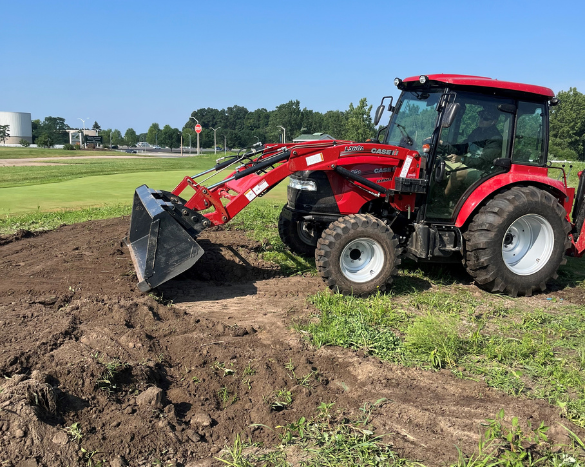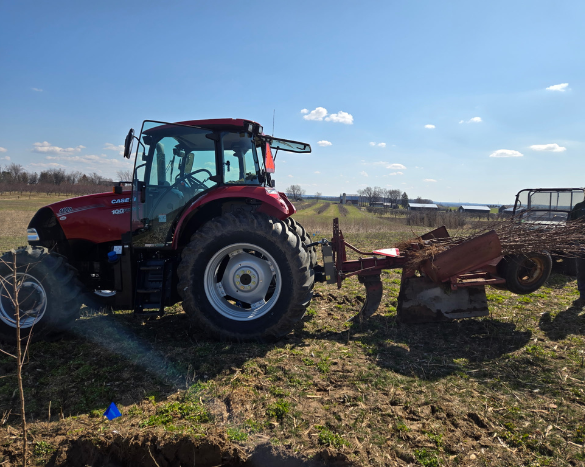CANR partners with Case IH to enhance research and education with advanced tractor technology
As part of this collaboration, CASE IH provides MSU with low-cost access to a fleet of high-performance tractors for use across campus farms and research properties.

A strategic partnership between College of Agriculture and Natural Resources (CANR), MSU AgBioResearch (ABR), and Case IH is advancing agricultural research and education. Under the terms of the partnership, CASE IH provides MSU with low-cost access to a fleet of tractors for use across campus farms and research properties. Thanks to this collaboration, these cutting-edge pieces of agricultural equipment are supporting critical operations and research initiatives both on and off campus.
With over 180 years of industry experience, CASE IH is a recognized global leader in powerful, reliable and highly efficient equipment that helps producers meet the challenges of modern agriculture.
“Our ongoing partnership with CASE IH makes a tremendous impact here on campus and across our many diverse research sites,” said George Smith, director of MSU AgBioResearch. “We are grateful to CASE IH for providing us with access to these high-performance tractors that enable our researchers, staff and students to carry out essential agricultural operations with precision and efficiency. These tractors not only support the day-to-day needs of our farms and research centers, but they also empower our faculty and students to push the boundaries of agricultural science and innovation.”
"When Case IH tractors are at work across MSU’s farms and research centers, they power vital research and reflect the strength, reliability and tradition that have defined our brand for over 180 years. We love seeing those qualities in every field, including the beautiful MSU campus,” said Kurt Coffey, Vice President of Case IH North America.
On-Campus Contributions
On MSU’s main campus, Case IH tractors are essential for research and maintenance operations:
At the Hancock Turfgrass Research Center, the Farmall 55C assists with turfgrass cultural practices such as topdressing, grading, and fertilizer application. It also supports minor excavation and growth media handling, contributing to the center’s mission of advancing turfgrass science.
“We are incredibly grateful for the generous support Case IH has provided to the Hancock Turfgrass Research Center in advancing our research mission,” said Jesse Sholl, Turf Research Center Manager. “The Farmall 55C tractor has become an essential asset in our daily operations, playing a key role in plot renovations, research project upkeep, and general maintenance across the facility.”

“With equipment like the Farmall 55C, we’re empowered to push the boundaries of turfgrass research and innovation,” said Dr. Kevin Frank, Professor and Turf Extension Specialist. “Its versatility and reliability have significantly enhanced our ability to perform a wide range of cultural practices in-house, allowing our team to operate more efficiently and effectively.”
The Farmall 75C, stationed at the Plant Pathology Field Laboratory and South Campus Landscape Maintenance, serves as the primary mowing tractor for research vineyards, orchards, nurseries, and right-of-way areas, ensuring these spaces remain well-maintained and accessible for ongoing studies.
“The Farmall 75C has been the go-to tractor for our farming needs and we are sincerely grateful for the support and generosity of Case IH,” said Lance Forsberg, Farm Manager, Entomology and Plant Pathology Research Centers. “It has been used year-round on our farm for growing and maintaining a diverse number of commodity, specialty and perennial crops and has exceeded our expectations with its capabilities. The versatility of the front-end loader has allowed us to also plow snow and move soil, making short work of these tasks.”
The Magnum 200 tractor is used at the Horticulture Teaching and Research Center and the Crop and Soil Sciences Agronomy Farm, supporting a variety of programs including soybean breeding, wheat breeding, wheat outreach, weed science, agronomy trials, soil fertility, maize breeding, potato breeding and field crop pathology. In addition, the Magnum 200 also supports operations at the Mason Research Farm and Plant Pathology Farm.
“We are very grateful for the support that Case IH has provided to the plant science researchers on south campus,” said Mike Particka Agronomy and Mason Farm Manager.
“Having the Magnum 200 available to support the 25 research programs that use the fields on south campus was a game-changer by enabling us to get our tillage completed in a timelier manner. Every operator stated that ‘it was the nicest tractor they ever operated.”
Off-Campus Impact
At the Kellogg Biological Station (KBS), the Magnum 340 tractor has become an indispensable asset. Its high-flow hydraulic pumps have enabled efficient operation of a hay baler/wrapper combo, while its robust power supports essential functions for the Long-Term Agroecosystem Research (LTAR) and Great Lakes BioEnergy Research Center (GLBRC) plots. From hauling a 1,000-bushel grain cart to pulling manure tankers and performing tillage operations, the Magnum 340 plays a vital role in maintaining and advancing MSU’s agroecological research.
“The Case Magnum 340 has been an incredible addition at KBS where there are over 1,000 acres of cropland that are spread out across four MSU owned properties over 10 miles apart,” said Brook Wilke, Associate Director for Science and Agronomy, KBS LTAR. “The size and road comfort provided by the tractor have been particularly beneficial, making large/heavy jobs such as hauling grain and baling hay and straw safer, more efficient, and more comfortable relative to the other smaller tractors in the KBS fleet.”
At the Trevor Nicholes Research and Extension Center, the Farmall 110N tractor is central to Integrated Pest Management (IPM) practices. It facilitates the precise application of plant protectant products across apple orchards, blueberry plots, and grape vines.
The tractor also supports studies targeting pests like the Spotted Wing Drosophila (SWD) and contributes to IR4 research, which evaluates the efficacy of registered plant protectants on crops not yet covered by existing labels—expanding their potential applications and improving crop protection strategies. An additional Farmall 110 tractor is also in use at the West Central Michigan Research and Extension Center (WCMREC) located in Hart, Michigan.
“The Farmall 110 is a crucial part of our farm operation. It has enabled us to expand our portfolio of vegetable research. We used it this spring to plant over 5,000 apple trees. In addition, it is essential to our cover cropping and soil health work as we onboard additional research exploring regenerative agriculture questions and strategies,” said Ashley Fleser, WCMREC Farm Manager. “In short, the Farmall 110 is a key support to our research and the safe and efficient operation of the West Central Michigan Research & Extension Center.”

Dr. Rufus Isaacs, faculty coordinator of the Trevor Nichols Research Center said that the Farmall 110N tractor they have onsite is improving efficiency by helping their farm management team protect plantings from insects, diseases and weeds in a timely manner this summer. “This means our farm manager doesn’t have to switch machinery on and off a single tractor to do herbicide spraying, so the maintenance program has been much more efficient”.
A Model for Innovation and Collaboration
This partnership exemplifies how academia and industry can collaborate to drive innovation in agricultural science. By integrating Case IH’s advanced machinery into MSU’s research infrastructure, the university enhances its capacity to conduct high-impact studies, train future agricultural professionals, and support sustainable farming practices.
As MSU continues to lead in agricultural research and education, the support from Case IH ensures that faculty, staff and students have access to the tools they need to cultivate knowledge and transform the future of farming.
About CANR: As MSU’s founding college, the College of Agriculture and Natural Resources (CANR) has a storied history tackling the world’s biggest problems related to food, health and the environment. From classrooms and labs to farm fields and forests, CANR Spartans are crafting solutions in Michigan that have a global impact.
About ABR: Michigan State University AgBioResearch scientists discover dynamic solutions for food systems and the environment. More than 300 MSU faculty conduct leading-edge research on a variety of topics, from health and agriculture to natural resources. Originally formed in 1888 as the Michigan Agricultural Experiment Station, MSU AgBioResearch oversees numerous on-campus research facilities, as well as 15 outlying centers throughout Michigan.
About CASE IH: With a global presence in more than 160 countries, CASE IH is recognized today as a global leader in powerful, reliable and highly efficient equipment that helps producers meet the challenges of modern agriculture.



 Print
Print Email
Email




